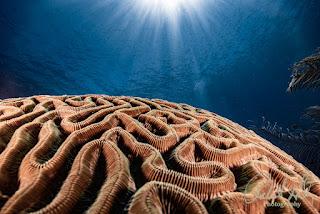A Beginner's Guide to Underwater Macro Photography
Introduction:
Beneath the ocean's surface lies an enchanting realm
awaiting exploration through the lens of a camera. Among the various techniques
available, underwater macro photography emerges as a captivating and rewarding
option, especially for beginners. In this comprehensive guide, we'll delve into
the nuances of macro photography, exploring its distinctions from wide-angle
approaches, the advantages of starting with macro, and how even budget-friendly
cameras or smartphones can yield impressive results.
Decoding the Depths of Macro Photography Underwater:
Macro photography involves the intimate capture of small
subjects, bringing to light intricate details often overlooked by the naked
eye. Transcending onto the underwater canvas, this technique allows
photographers to venture into the microcosm of marine life, unveiling the
vibrant colors and unique textures of diminutive creatures such as nudibranchs,
shrimp, and coral polyps.
Divergence from Wide-Angle Photography:
In contrast to wide-angle photography, which embraces
expansive underwater landscapes, macro photography narrows its focus to the
smaller, yet equally mesmerizing, subjects. While wide-angle shots showcase the
grandeur of coral reefs or the silhouettes of large marine creatures, macro
photography zooms in on the minute details that make the underwater world truly
captivating.
The Allure of Macro Photography for Beginners:
For those just dipping their toes into the world of
underwater photography, macro photography presents several advantages that make
it an appealing starting point. Firstly, macro subjects are abundant, making it
easier for beginners to find fascinating creatures without venturing far from
the shore. Secondly, macro setups typically demand less specialized
equipment compared to their wide-angle counterparts, providing a cost-effective
entry into the realm of underwater photography. The third reason to consider Macro Photography is that since you will be focused on close subjects, you will not be plagued with sediment in the water as you would be with Wide-Angle shooting. Remember: the closer you are to a subject, the less backscatter and the better color you will achieve.
Harnessing the Power of Inexpensive Cameras and Smartphones:
Contrary to common belief, achieving stunning results in
underwater macro photography doesn't necessitate top-tier camera gear. Many
compact cameras and even some smartphones come equipped with macro modes
capable of capturing the intricate details of the underwater world. Today's smartphones and inexpensive housings allow you to get professional results with just a small initial investment. While
professional setups offer advanced features, beginners can achieve remarkable
results with affordable alternatives.
Advantages of Immersing in Macro Photography Underwater:
- Accessible
Marvels: Macro subjects are often found in shallow waters, making it
convenient for beginners to discover and capture interesting marine life. Though good buoyancy skills are required.
- Budget-Friendly
Equipment: Macro setups are generally more wallet-friendly compared to
their wide-angle counterparts. Compact cameras and smartphones with macro
capabilities offer impressive results without a hefty price tag.
- Detailed
Exploration: Macro photography invites photographers to explore the
nuanced patterns, textures, and vibrant colors of small underwater
subjects, providing a unique perspective on marine life.
Challenges of Macro Photography Underwater:
- Limited
Field of View: The challenge of macro photography lies in its
restricted field of view, necessitating close proximity to subjects. This
closeness can potentially disturb delicate marine life or lead to
visibility issues in specific conditions.
- Specialized
Lighting Requirements: Achieving optimal lighting for macro shots
underwater can be demanding. External strobes or video lights may be
necessary to effectively illuminate the subject.
Conclusion:
Let me assist you in your underwater photographic journey with my upcoming online training course, which I will be announcing soon. If you are keen on acquiring more knowledge about it, kindly email me at bob@robertherb.com. You can also visit my website (Robert Herb Photography) to view some of my exemplary work.
I am eagerly anticipating your valuable feedback and suggestions.
Sincerely,
Bob Herb




Comments
Post a Comment
Please let me know your comments.